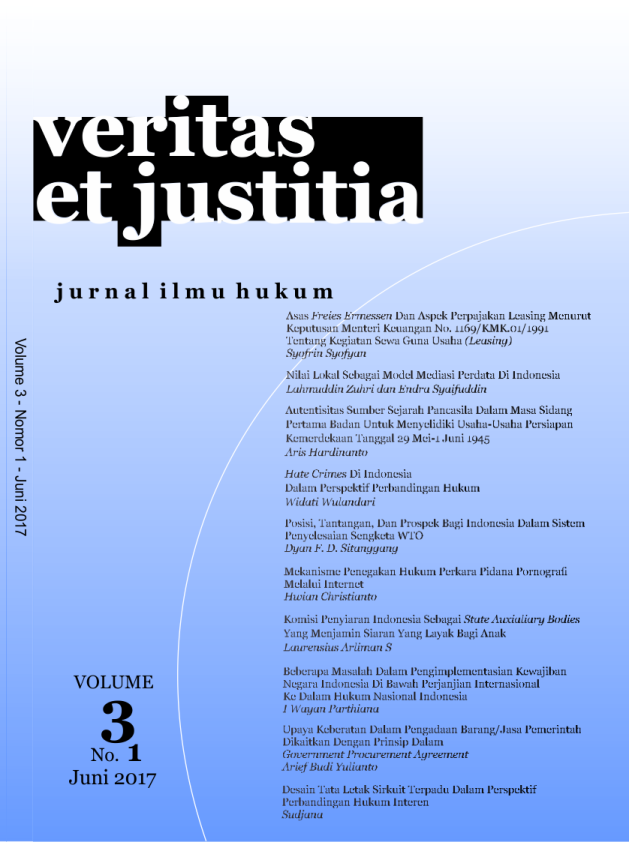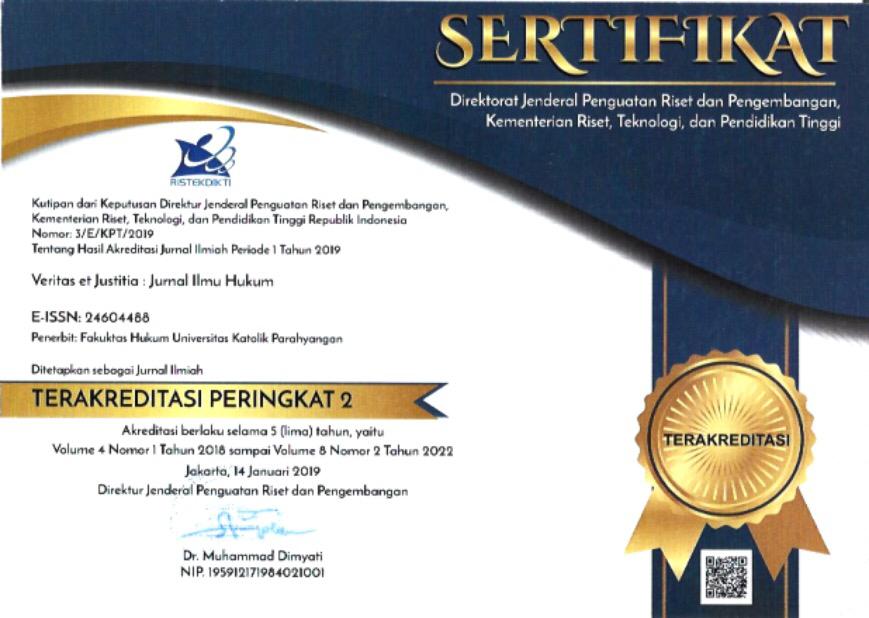UPAYA KEBERATAN DALAM PENGADAAN BARANG/JASA PEMERINTAH DIKAITKAN DENGAN PRINSIP DALAM GOVERNMENT PROCUREMENT AGREEMENT
DOI:
https://doi.org/10.25123/vej.v3i1.2530Abstrak
The Government Procurement Agreement (GPA), as part of agreements made within the purview of the World Trade Organization (WTO), opens up the doors for foreign businesses to enter the domestic market of government procurement (goods/services). Indonesia at present does not yet signed the GPA but decided to become an observer instead. Consequently, the government decides to harmonize its national laws regulating government procurement mechanism or procedure with the international standard (GPA). This article shows that there still exist a huge difference in how the national law regulates the public auction procedure (complaints, challenges and dispute resolution mechanism) with the GPA, which is used as a reference. This situation should be dealt with should Indonesia decides to sign and ratify the GPA.
Referensi
Daftar Pustaka
Buku
Agus Yudha Hernoko, Hukum Perjanjian Asas Proporsionalitas Dalam Kontrak Komersial, Kencana Prenadamedia Group, Jakarta, 2004.
Kartajoemena H.S., GATT, WTO dan Hasil Uruguay Round, Universitas Indonesia, Jakarta, 2002.
Mochammad Jasin, Mencegah Korupsi Melalui E-procurement, Komisi Pemberantasan Korupsi, Jakarta, 2007.
Samsul Ramli, Bacaan Wajib Para Praktisi Pengadaan Barang/Jasa Pemerintah, Visimedia, Jakarta, 2013.
Soerjono Soekanto dan Sri Mamudji. Penelitian Hukum Normatif: Suatu Tinjauan Singkat, Rajawali Pers, Jakarta, 2012.
Sumber Hukum
Herzein Inlandsch Reglement (HIR).
Kitab Undang-Undang Hukum Acara Pidana (KUHAP).
Undang-Undang Nomor 5 Tahun 1999 tentan Larangan Praktek Monopoli Dan Persaingan Usaha Tidak Sehat.
Peraturan Presiden Republik Indonesia Nomor 54 Tahun 2010 tentang Pengadaan Barang/Jasa Pemerintah.
Peraturan Presiden Republik Indonesia Nomor 35 Tahun 2011 tentang Perubahan Atas Peraturan Presiden Republik Indonesia Nomor 54 Tahun 2010 tentang Pengadaan Barang/Jasa Pemerintah.
Peraturan Presiden Republik Indonesia Nomor 70 Tahun 2012 tentang Perubahan Kedua Atas Peraturan Presiden Republik Indonesia Nomor 54 Tahun 2010 tentang Pengadaan Barang/Jasa Pemerintah.
Peraturan Presiden Nomor 172 Republik Indonesia Tahun 2014 tentang Perubahan Ketiga Atas Peraturan Presiden Republik Indonesia Nomor 54 Tahun 2010 tentang Pengadaan Barang/Jasa Pemerintah.
Peraturan Presiden Republik Indonesia Nomor 4 Tahun 2015 tentang Perubahan Keempat Atas Peraturan Presiden Republik Indonesia Nomor 54 Tahun 2010 tentang Pengadaan Barang/Jasa Pemerintah.
Peraturan Menteri PU Nomor 323/PRT/M/2005 tentang Tata Cara Penanganan Masukan Dari Masyarakat di Lingkungan Departemen Pekerjaan Umum.
The General Agreement On Tariffs And Trade, Geneva, July 1986, Agreement On Government Procurement.
Lainnya
Agreement on Government Procurement Parties, Observers and Accessions diakses dari https://www.wto.org/english/tratop_e/gproc_e/memobs_e.html
Kwik Kian Gie, Kebijakan Pengadaan Barang/Jasa Instansi Pemerintah (Government’s Goods/Services Procurement), Naskah pidato Menteri Negara Perencanaan Pembangunan Nasional/Kepala Bappenas pada Pertemuan Tingkat Menteri di Jakarta, dalam Konferensi Tingkat Menteri (KTM) WTO-V di Cancun Mexico, 7 Agustus 2003
Understanding The WTO Settling Disputes diakses dari https://www.wto.org/english/thewto_e/whatis_e/tif_e/disp1_e.htm
##submission.downloads##
Diterbitkan
Terbitan
Bagian
Lisensi
Authors who publish with this journal agree to the following terms:
Authors retain copyright and grant the journal right of first publication with the work simultaneously licensed under a Creative Commons Attribution License that allows others to share the work with an acknowledgement of the work's authorship and initial publication in this journal.
Authors are able to enter into separate, additional contractual arrangements for the non-exclusive distribution of the journal's published version of the work (e.g., post it to an institutional repository or publish it in a book), with an acknowledgement of its initial publication in this journal.
Authors are permitted and encouraged to post their work online (e.g., in institutional repositories or on their website) prior to and during the submission process, as it can lead to productive exchanges, as well as earlier and greater citation of published work.
The Journal allow the author(s) to hold the copyright and to retian publishing rights without restrictions.










